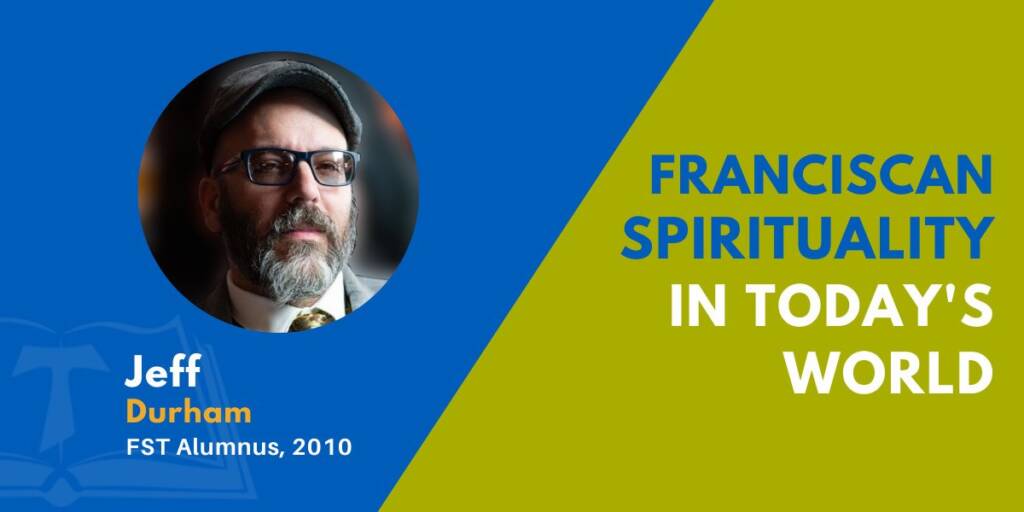Unless you plan to enter the clergy, you may wonder: What can you do with a theology degree? It just so happens that the study of theology provides an incredibly valuable, interdisciplinary skillset that’s ideal for a range of careers.
Most course content in a college theology program will focus on the study of religion, its effect on world cultures, and the interpretation and analysis of religious texts. Theology students not only build a strong academic connection to their faith, but also hone their skills in critical thinking, analysis, communication, logical debate, research, and maintaining objectivity.
Graduates with theology degrees are attractive job candidates for churches and religious organizations, as well as for some law firms, schools and universities, nonprofits, and health systems. In truth, there is no shortage of workplaces that are looking for job candidates with a background in theology, especially if they have an advanced degree.
Read on to discover dozens more professional opportunities for those with a theology degree.
The Intersection of Theology and Work
Theological instruction is not limited to the study of faith; students of theology learn and practice a great number of valuable skills that transcend subject matter. Skills such as critical thinking, oral and written communication, research, and logical analysis prepare graduates of a theological studies program to enter dozens, if not hundreds, of faith-based or secular careers.
In fact, because of their academic foundation in critical thinking and analysis, theological program graduates tend to perform exceptionally well on assessments such as the Graduate Record Examination (GRE) or Law School Admission Test (LSAT). Theological studies also emphasize acceptance and understanding of different cultures, so graduates often find themselves entering the competitive international job market with a wide range of practical skills.
Many people who enter a theological studies master’s program possess innate characteristics that lead them to choose this field of study. Empathy, compassion, patience, and a love of helping others are common traits among theology students that can’t be taught via textbook or lecture. As a result, many graduates go on to enter helping professions, including counselor, military chaplain, or hospice nurse.
Top 26 Theology Careers
Now it’s time to explore the top religious and secular careers available to graduates with a theology degree. The salary estimates below are based on U.S. career data (ca. 2025) from Indeed.com, Comparably.com, and Salary.com. People in these professions may see a significant increase in salary depending on experience or location. Please be aware that many of these positions will require additional schooling or training.
Religious Jobs
- Chaplain/cleric (military, hospice, hospital, police, etc.) – $69,000: Provides spiritual care, emotional support, and sacramental ministry within secular institutional settings such as hospitals, hospices, prisons, the military, or law enforcement. Chaplains serve people of all faiths (or no faith) and may assist with grief, ethical dilemmas, crisis intervention, and end-of-life care. Many roles require Clinical Pastoral Education (CPE) and certification.
- Church administrator – $39,000: Oversees the operational and administrative functions of a church or parish, often handling scheduling, budgeting, communications, facilities management, and support for pastoral staff. In some churches, they may also coordinate ministry programs or manage lay volunteers.
- Minister/priest/pastor/clergy member – $53,000: Leads a parish or congregation in worship, sacramental ministry, pastoral care, preaching, and spiritual leadership. Responsibilities often include overseeing religious education, community outreach, and administrative duties. Requires a Master of Divinity (MDiv) and ordination within one’s denomination or faith tradition.
- Missionary – $44,000: Engages in cross-cultural service and evangelization, often working to promote spiritual formation, community development, or humanitarian aid in domestic or international settings. Missionaries may teach, build infrastructure, offer healthcare support, or provide pastoral care.
- Music director – $31,000: Leads and coordinates music for worship services, including selecting hymns, directing choirs or ensembles, and playing organ or piano. Works closely with clergy to plan worship and may oversee volunteer musicians, special performances, or seasonal music programs.
- Religion or theology professor/university lecturer – $57,000: Teaches theology, ethics, scripture, or religious studies at the undergraduate or graduate level, often within seminaries, liberal arts colleges, or divinity schools. Duties may include scholarly research, publishing, mentoring students, and contributing to academic conferences. A PhD is typically required for tenure-track positions, though MTS graduates may teach at some community or Bible colleges.
- Religious studies teacher/teacher at a religious school – $40,000: Educates students in religious subjects, either in K–12 faith-based schools or in public school settings where religion is taught as part of social studies or cultural education. May also teach secular subjects within a religious framework. This role integrates pedagogy with theological or pastoral awareness and often requires teacher licensure in addition to a theology degree.
- Youth pastor – $44,000: Designs and leads spiritual formation programs, events, retreats, and educational experiences for young people in churches, camps, or schools. Provides mentorship, pastoral care, and faith development opportunities for children and teens. Youth pastors often collaborate with parents and parish staff to foster intergenerational faith communities.
- Spiritual counselor – $39,000: Provides faith-based guidance and emotional support to individuals seeking spiritual direction, healing, or discernment. May work independently or within healthcare, retreat, or parish settings. Spiritual counselors draw from theological education, prayer practices, and pastoral presence to accompany people through personal or spiritual challenges.
Secular Jobs
Education & Research
- Anthropologist – $84,000: Explores human societies past and present by studying cultural traditions, behaviors, biological traits, and language patterns. Anthropologists often work in academic, nonprofit, or governmental settings, and theology graduates bring a nuanced understanding of how religious belief shapes human experience and culture.
- Archaeologist – $71,000: Investigates ancient civilizations by analyzing physical remains such as ruins, tools, art, and burial sites. Often employed by museums, universities, or cultural heritage organizations. Theology students with a historical or Biblical interest may focus on religious sites or sacred texts’ material culture.
- Archivist – $63,000: Preserves and organizes historical documents, photographs, and artifacts for libraries, museums, religious orders, or educational institutions. Religious communities often hire archivists to maintain sacred texts, sacramental records, and institutional histories, all roles where theology grads with strong research skills can thrive.
- Ethicist – $47,000: Advises on ethical decision-making in fields such as healthcare, business, law, or public policy. May serve on hospital ethics committees, contribute to academic research, or consult in corporate ethics. Theology students are well-suited due to their moral reasoning, philosophical training, and understanding of applied ethics.
- Historian – $78,000: Researches and interprets the past using documents, oral histories, and artifacts. Historians may focus on religious movements, church history, or theological developments. Theology degrees provide valuable training in analyzing historical texts and understanding their cultural and religious contexts.
- K–12 Teacher – $40,000: Instructs students at the elementary, middle, or high school level across a variety of subjects. Theology majors bring strong communication, ethical perspective, and interdisciplinary thinking to the classroom, making them effective educators in both public and private settings.
Care & Counseling
- Counselor (marriage, family, grief, youth, domestic violence, trauma, etc.) – $39,000: Supports individuals and families through emotional, relational, or psychological challenges. May work in schools, hospitals, clinics, or private practice. Theology graduates often pursue this path by earning counseling licensure, using their background in ethics, empathy, and pastoral care to guide clients.
- Funeral director – $65,000: Manages all aspects of funeral planning, including working with grieving families, coordinating services, and arranging legal and logistical details. A career rooted in compassion and ritual, it resonates with theology graduates drawn to helping others through end-of-life transitions.
- Social worker – $70,000: Provides direct support to vulnerable populations through counseling, advocacy, and resource coordination. Often employed in schools, hospitals, or government agencies. Theology’s emphasis on compassion, service, and respect for the dignity of the human person aligns well with this vocation.
Nonprofit Leadership & Advocacy
- Humanitarian aid worker – $100,000: Provides disaster relief, development assistance, or healthcare support in areas affected by poverty, war, or crisis. Often employed by faith-based or secular NGOs. Theology graduates contribute not only logistical support but also a grounding in human dignity, solidarity, and intercultural empathy, all core Franciscan values.
- Non-governmental organization (NGO) worker – $49,000: Supports community development, education, healthcare, or advocacy efforts through roles such as program manager, grant writer, or educator. NGOs often value employees with ethical leadership and cultural humility, qualities deeply cultivated in theological study.
- Nonprofit worker – $56,000: Operates in mission-driven organizations that address social, educational, or religious causes. Roles may include event coordination, fundraising, communications, or program support. Theology graduates often find alignment between their values and the nonprofit sector’s commitment to service and justice.
Communications & Media
- Journalist – $49,000: Gathers and reports news for print, broadcast, or digital platforms. Journalists with a background in theology can act as religious correspondents to major news outlets or regular contributors to magazines and online publications. Wartime correspondents may especially benefit from theological foundation, since many international and intercultural conflicts have a religious element.
- Writer – $71,000: Creates written content for print, digital media, or literary publications. Freelance and staff writers can specialize in theology, spirituality, ethics, or faith-based commentary. Theology graduates excel here due to their training in analysis, reflection, and clear communication.
Justice, Service & Civil Roles
- Diplomat – $153,000: Serves as an official representative of their country in foreign relations, negotiating policy and promoting peace, trade, or security. Theology graduates may excel in diplomacy due to their skills in intercultural communication, ethical reasoning, and global religious literacy.
- Lawyer – $127,000: Represents individuals, organizations, or governments in legal matters, including litigation, negotiation, and legal research. A theology background builds strong foundations in ethics, critical thinking, and persuasive communication, all of which are highly valuable in legal practice. Many theology graduates pursue a Juris Doctor (JD) after completing their MTS or related degree.
- Police officer/civil service – $70,000: Serves the public by enforcing laws, promoting safety, and building community trust. Civil service includes a wide range of roles (e.g., corrections, border patrol, fire inspection). Theology-trained professionals bring integrity, empathy, mental health awareness, and moral discernment to these high-responsibility positions.
Other professions to consider
Though these careers may have no direct link to faith, many graduates with a theology degree seek to become healthcare administrators, healthcare workers (with additional education), administrators in higher education, or retreat facilitators or administrators.
9 Employers Who Look for a Theology Degree
It likely comes as no surprise that most churches and religious groups prefer job candidates to hold a bachelor’s or master’s degree in a relevant field. However, since a degree in theological studies or ministry implies so many interdisciplinary skills, many different kinds of employers like to see this type of experience on an applicant’s resume.
See overview: University of San Diego – Master of Theological Studies
Some types of employers who seek theology students include:
- Catholic or other Christian lay organizations
- College divinity departments
- Dioceses
- Faith-based nonprofits
- Hospice care coordinators
- Hospital chaplaincy programs
- Law firms
- Religious camp organizers
- Religious primary and secondary schools
- Counseling centers
What Are the Best Degree Options for Theology Careers?
There are so many possible career options with a master’s degree in theology, so your professional path may be strongly informed by the kind of program you choose.
| Bachelor’s Degrees | Master’s Degrees | Doctoral Degrees | |
| Time to Earn | 3–4 years | 2–4 years | 3–8 years |
| Degree Options | Religious Studies: This type of undergraduate program usually takes a broad approach to religions, and is tailored to students who wish to study multiple world religions, their cultural significance, and historical and contemporary impact. Philosophy: Undergraduate philosophy students learn the basic principles of logic and reasoning while building their skills of analysis, critical thinking, written and oral communication, and constructing logical arguments. Besides a B.A. in Religious Studies, this is the ideal preparation for seminary or a master’s degree in Theological Studies. | Theological Studies (2 years): This academic master’s degree program examines the languages, beliefs, history, and cultural impact of religion throughout the centuries and today. Programs are often informed by one central faith, which provides a lens through which course material is interpreted. Ministry (2 years): Master of Ministry programs often have a broader focus on the Christian “ministerial arts,” and can include elements of theology, philosophy, Biblical study and interpretation, and of liberal arts such as communication and education. Additional certification or schooling may be required to enter teaching positions. Divinity (3 years): A Master of Divinity (MDiv) is typically required to enter active Christian ministry. Most MDiv programs will focus on a specific denomination and may include temporary, supervised placement in a parish. The MDiv is the most common professional degree for those pursuing ministry in North America. Seminary (3–4 years): This is an institution designed specifically to prepare students for the clergy. A seminary student will study theology, hone their ministerial skills, and analyze scripture within a specific Christian denomination, after which graduates will begin the process of ordination. A bachelor’s degree is required for entry. | Juris Doctor (3 years): As mentioned previously, theology’s focus on critical thinking and objectivity is well-suited to students who are interested in pursuing law degrees. Many students of theology go on to earn this graduate-level degree in preparation for becoming lawyers. PhD (4–8 years): Theology students can earn a Doctor of Philosophy (PhD) in any field they desire after earning their master’s degree. A PhD enables graduates to teach at the university level within their chosen field. |
Careers with a Degree in Theology vs. Ministry
Master of Theological Studies Careers
A Master of Theological Studies (MTS) is considered an academic degree, as opposed to a professional degree. As such, it is research-focused and typically requires a capstone or thesis component. Though this degree is not tailored specifically to one profession, an MTS can prepare graduates for teaching religion at the elementary, high school, or community college level.
Other potential career paths include:
- Chaplain
- Civil servant
- Community ministry (youth, college campus, camp, etc.)
- Counselor
- Diocesan catechetical leader
- Director of diocesan media and communications
- Further academic research
- Historian or archivist
- Healthcare professional
- Lawyer
- Musician
- Nonprofit leader
- Parish administrator
- Religious education coordinator
As an alternative to entering the workforce, many graduates with an MTS degree go on to pursue further academic research, often to earn their PhD.
Master of Ministry Careers
A Master of Ministry (MMin) can either be an academic or professional degree. It takes a broader approach to the Christian ministerial arts than an MTS, incorporating units in philosophy, history, education, communication, and psychology as they pertain to active ministry. Since its scope is more general than an MTS, the career opportunities for someone with an MMin are much less specific.
However, the next steps for someone with this degree may include:
- Community ministry
- Parish administration
- Religious education
Like MTS graduates, those with an MMin may pursue further academic research for a doctoral degree.
Theology Career Outlook
Since a degree in theology helps students build such a wide range of skills, the career outlook for someone with a theology degree may look different depending on individual goals. For example, besides achieving a clergy position, someone with a theology degree may be prepared to enter the fields of public administration, communications, or international relations.
According to the U.S. Bureau of Labor Statistics, professionals entering a career in social services (including ministry) can expect roughly a 5% increase in job prospects from 2024–2034 (though clergy positions, specifically, are projected to grow by only 1%). That being said, skilled spiritual leaders and religious teachers are always in high demand by parishes and religious secondary schools.
The median annual salary of someone with a theology degree changes based on their profession, but the average social services salary tends to hover around $54,000 (clergy members made an average of $60,820 in 2024). Higher salaries are generally associated with careers in higher education, or for those with advanced degrees.
Salary aside, the kinds of jobs held by theology majors offer great personal satisfaction and fulfillment, and often become lifelong professions.
How to Start Your Theological Career
Earning a theology degree can be a very intentional step toward a specific profession, but it’s also a common choice for people who are searching for their next purpose. No matter your professional or personal goals, if you choose to earn a degree in theology, it’s likely that you have a strong connection to your faith.
As you examine your priorities, it’s important that you check in with your commitment as it pertains to your faith. Ask yourself the following questions as you work to discern your ideal vocation:
- Do I feel called to serve in a church or diocese, or would I rather serve my faith in a more secular capacity?
- Where is God already at work in the world — and how am I being invited to join?
- How does my life reflect the Gospel’s call to justice, peace, and reconciliation?
- What gifts has God given me to serve the marginalized and care for creation?
- In what context am I being called to be a servant leader?
Whether you want to teach, preach, or follow your faith in other ways, be aware that many possible career paths require additional schooling or certifications. For example, parish ministry requires that you earn an MDiv and become ordained, while teaching at the university level requires a PhD. Specific professions such as hospital chaplaincy or youth ministry may also require that you complete an internship or practical hours onsite at a facility.
It helps to talk with others who have the kinds of careers you want, and ask them how they reached their professional goals. Theology program faculty and alumni are great resources for career guidance. You may also join or volunteer at a local church, faith-based nonprofit, or other organization that performs the kind of work you’re interested in.
There are plenty of faith-based professional organizations that offer professional development, networking opportunities, and other career resources for theology majors. Organizations to explore include:
- The Young Catholic Professionals is a community of business owners, educators, and influential young people in their 20s and 30s who work to spread the word of Christ through local networking chapters.
- The Association of Youth Ministry Educators (AYME) is committed to developing the next generation of youth ministers through networking, scholarly contributions, and critical engagement with the practice of youth ministry.
- The Knights of Columbus is a Catholic brotherhood that puts faith into charitable action by volunteering, fundraising, sponsoring, and giving back to their communities.
- As the world’s largest society dedicated to the academic study of religion, the American Academy of Religion connects scholars for collaboration, discussion, networking, and professional development.
- The National Association of Pastoral Musicians is dedicated to fostering the art of musical liturgy in Catholic communities across the U.S.
- The Association of Theological Schools (ATS), which accredits theology programs in the U.S. and Canada, maintains an online community for students and scholars to connect, share ideas, and network.
- Palliative care organizations, such as the Hospice and Palliative Nurses Association (HPNA) and CaringInfo
Other organizations and communities to be aware of as you begin your professional journey include:
- Christian Community Development Association
- National Association of Catholic Chaplains
- National Black Catholic Congress
- National Catholic Partnership on Disability
- Society of Biblical Literature
- Society of Professors in Christian Ministry
Are you ready to take your next step toward one of the exciting careers explored in this post? Start a conversation with a USD advisor today, and see where a Master of Theological Studies – Franciscan Theology can take you.
Theology Careers: Frequently Asked Questions
Can I major in theology online?
Yes! Many schools (such as the Franciscan School of Theology at the University of San Diego) offer online Master of Theological Studies programs that can be completed in two years. Students anywhere in the country can take advantage of these location-agnostic programs, many of which can be completed on a timeline that is most convenient for the student. Online masters degree programs can often be taken part time, which is ideal for someone who needs a more flexible schedule.
Can women earn Catholic theology degrees?
Yes, women can earn Catholic theology degrees at every level through Catholic universities, seminaries, and theological schools. While the Catholic priesthood is reserved for men, women often study theology to serve as teachers, chaplains, lay ministers, nonprofit leaders, writers, and scholars. Many Catholic institutions, such as the Franciscan School of Theology at the University of San Diego, actively encourage women to pursue advanced theological education and leadership within the Church and the wider world.
How do I choose a theology degree program?
As with any degree program, there are lots of factors that will help you narrow down your program choices. Your ultimate career goals and personal beliefs and values will likely be primary deciding factors, followed by program location, faculty and alumni testimonials, and available financial aid. Reach out to advisors for the programs you’re considering, and they may be able to connect you with a faculty member or alum who can answer any questions.
How long does it take to complete a theology degree program?
Depending on your level of study, a theology degree program can take anywhere from 2–4 years. A bachelor’s degree in theology will likely take 4 years to complete, while many master’s degree programs can be completed in 2–3 years.
How much does a theology degree program cost?
Tuition will vary depending on the institution or program level, but there are many scholarships available for theology students. As an example of the tuition range, a Master of Theological Studies from Harvard University costs $31,080 per year, while the online Master of Theological Studies – Franciscan Theology program at the University of San Diego costs $28,800 total.




